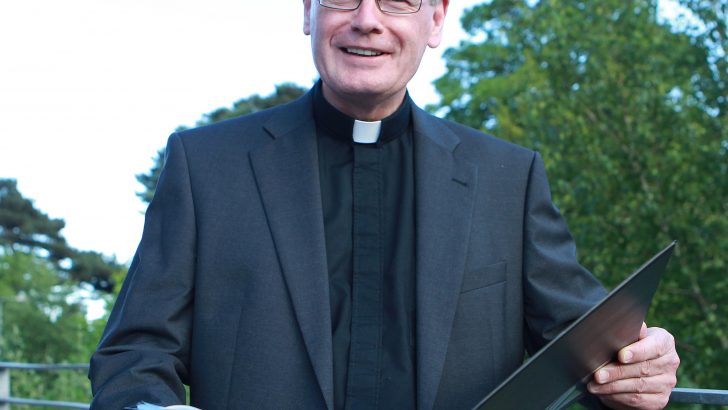Martin O’Brien meets Fr Edward O’Donnell, a priest happy in his ministry and his own skin
Fr Edward O’Donnell, first ever Catholic ecumenical canon in Belfast’s Protestant cathedral, parish priest in one of the North’ s most well to do areas, former private secretary to the late Bishop Cahal Daly, noted homilist, and proud native of Heaney country in south Derry looks younger than most 67-year old men. It may have something to do with his sunny disposition.
Despite the scandals that have engulfed the Church in Ireland and his disappointment at the “grumbles” of some brother priests in the media he is upbeat while not being complacent.
“Of course, there are things that are not right and could be done better. However, I am not disgruntled with the Church, sometimes disappointed, just as I am disappointed with myself, but I am happy, and I hope I communicate that. I am happy in my own skin and with what I do.”
Blessed
Eddie O’Donnell is grateful that he has been blessed with good health, still not requiring any medication, yet mindful of life’s fragility, reminding me that his father died of an aneurism at the age he is now. We’re in his presbytery outside St Brigid’s Church in south Belfast, where he has been parish priest for seven years.
He’s grateful that the attendance at Sunday Mass has remained stable in that period, at around 2,000. According to the Down and Connor directory the estimated Catholic population of the parish is 13,500, making it numerically the biggest in the diocese.
It is one of the wealthiest parts of the region but Fr O’Donnell stresses that financial wealth and spiritual wealth do not always go together.
He says that the economic downturn had a more severe effect on his parish than is realised and that parts of it experience “great poverty”.
“There are more ‘newcomers’, immigrants and refugees in a particular ‘end’ of our parish area than anywhere else in the diocese. Many of those people in a very poor situation are not Catholics at all where our parish St Vincent de Paul Society go and minister to those in need and the need is great.”
He considers the biggest challenge facing his parish – and parishes all over Ireland – one that he poses to the parish pastoral council: “How will you preserve the faith in St Brigid’s when there is no priest?”
Fr Eddie is recognised as one of the best homilists of his generation and his giftedness in this area has been enhanced by his love and fascination for Scripture.
His Sunday sermons are invariably listened to intently – as a parishioner I can attest to that – and timed at just eight minutes, containing 800 words. They are Gospel-based, well balanced, written in simple language, and don’t dodge uncomfortable issues.
Homilies at daily Mass lasting three or four minutes are carefully prepared and enhance the congregation’s knowledge and understanding of Scripture.
He is one of a small group of priests in Down and Connor who, following up Pope Francis’ advice on homilies in Evangelii Gaudium, are working to promote greater consistency in quality.
Eddie O’Donnell was born in Hillhead, near Bellaghy in south Derry in 1950, the eldest of three children of Jimmy O’Donnell, a small farmer, and his wife Sarah (nee Heaney).
It appears his mother may have been a distant relative of Seamus Heaney, the poet and Nobel Laureate, whom he knew slightly.
“There was a friendship between our families. Seamus’ father used to visit my home and my mother would have gone down to visit his mother.”
Eddie’s birthplace was a stone’s throw from the blacksmiths that inspired ‘The Forge’, and from the site of the poet’s primary school immortalised in ‘Anahorish’.
The Broagh, nearby, the townland where Eddie’s family moved to when he was very small, is the subject of another place-name poem, ‘Broagh’ (in Wintering Out).
“I know so many of the people and places he wrote about. Grove Hill [mentioned in ‘The Riverbank Field’] was my mother’s farm; Leitrim [mentioned in ‘Edward Thomas on the Lagans Road’] was where my father’s farm was, and I remember (Big) Jim Evans, (‘Mid-Term Break’) the roadman, coming into our house to get boiling water to make his tea.”
Heaney clearly means a lot to Fr Eddie, and a few months ago he led a visit by parishioners to Home Place, the Heaney museum in Bellaghy. “He is part of my heritage.”
Fr Eddie was ordained in 1976 and quickly found himself thrown in at the deep end as a chaplain at Belfast City Hospital. He has many memories from that troubled period.
On his first Easter Sunday as a priest he recalls a deadly feud between the Provisional IRA and the Official IRA in Belfast re-igniting around the Easter republican parades. Within hours two people were killed, a 10-year boy in a bomb explosion (a victim of the UVF but briefly assumed to be a victim of the feud) and a middle-aged man shot in supposed retaliation.
“I was in the casualty department of the Royal Victoria Hospital with doctors and nurses trying to cope as best they could. It was pandemonium. I can remember one man coming up to me and putting his fingers into my face and he said, “by tonight ten more dead”. And then in the middle of it all there had been a traffic accident in which a poor man had been killed and I was ministering to his relatives as well as to the others. It was just crazy.”
*****
In 1982 Fr O’Donnell was asked “out of the blue” by Cahal Daly, the newly-appointed Bishop of Down and Connor, whom he had never met, to be his private secretary.
“He was essentially a very simple person, he had simple needs and was easy to work for and difficult to work for. Easy, in that in all my years with him I never received a critical word: if something went wrong he said it was his fault because he hadn’t explained things clearly enough. Difficult because you were on call literally seven days a week, he worked at a ferocious rate.
“He was a very friendly man who was concerned for you personally and very interested in your family and when my father took ill he visited him in hospital.”
Probed on whether Daly would have known about the Redemptorist-inspired secret peace initiative pursued by Fr Alec Reid CSsR, Fr O’Donnell is emphatic: “He was totally aware because Alec Reid would have frequently have come to brief him” [at his Belfast residence] and while he doesn’t know if that briefing continued when Daly went to Armagh, it appears likely that it did. (See my article ‘Unearthing Cahal Daly’s contribution to peace’, The Irish Catholic, October 12, 2017, www.irishcatholic.ie)
He credits Daly with “opening my eyes to a worldwide Church. Suddenly, I became aware of a whole diocese, the whole country and the universal Church through all the contacts [he had].”
Fr O’Donnell has no doubt that Daly, an ardent ecumenist, would have been delighted with the surprise news last year that he (O’Donnell) had been appointed an ecumenical canon at St Anne’s Church of Ireland Cathedral in Belfast.
One of his duties as a Canon is to preach at St Anne’s once a year – he gave his first sermon there last May in which he cited the ‘Common Declaration’ of Pope Francis and Archbishop Justin Welby of Canterbury in which they stated: “Wider and deeper than our differences are the faith that we share and our common joy in the Gospel.”
“When I am preaching in St Anne’s I am preaching on the Scripture of the day, what I understand it is saying to us and I am sharing with those people what is in my heart.”
Fr O’Donnell drew my attention to a book that he has been reading, In God’s Hands: The Spiritual Diaries of Pope St John Paul II 1962-2003 in which the future saint says that Christ will hold priests to account for how they discharge His priesthood.
He says that St John Paul warns priests of the three “great sins” that they can commit which are sacrilege, hypocrisy and egotism, the latter he says, Pope Francis would probably describe as “clericalism.”
I wondered had he ever witnessed the “sins of clericalism” that Pope Francis has warned or recognised clericalism in that sinful sense.
“I can recognise it in myself. Maybe somebody says something to me that I think is unjustified and I say ‘I am a priest’. That’s it [clericalism] and it is something that I must be alert to. People owe me nothing and I shouldn’t feel they do.”


 Martin O'Brien
Martin O'Brien Fr Edward O'Donnell
Fr Edward O'Donnell 